The Delta Read online
Page 2
The president was an old man, near the end of his life, and Sibanda and a small group of other veterans of the liberation war serving in the military and politburo were concerned about what the future would hold for the party and themselves when the unthinkable happened and the great man passed away. Their plan, now being so flawlessly executed, would cast the opposition as international pariahs for years to come.
‘What are our orders, Major?’
‘Destroy the vehicle.’
The pilot hesitated. ‘Surely, sir, you want to try and take the assassin alive? Perhaps some warning shots or …’
‘Destroy the vehicle.’ The story about the assassin confessing, about it being a man rather than a woman, was all part of Sibanda’s plan.
‘Yes, sir.’
The avionics and weaponry on board the Hind were not sophisticated – they dated from the early 1980s – but they were nonetheless deadly. In the swivelling turret under the gunner, who sat in front of and below the pilot, was a multi-barrelled rotating 12.7 millimetre machine-gun, and under the stubby wings on either side of the gunship were air-to-ground rockets housed in pods.
‘Pilot to gunner, select guns and destroy the Land Rover,’ the pilot said.
‘Roger,’ replied the gunner, ‘selecting guns.’
The gunner walked the rounds on to the Land Rover and Sibanda’s heart pounded as he saw the fat projectiles strike home, ripping open the aluminium roof of the four-by-four like a tin opener.
‘It is a strong vehicle, Major,’ the pilot said as their shadow passed over the truck which, despite a cloud of steam gushing from a hole in the bonnet, was still bouncing slowly but surely across the open grassy plain.
‘Use the rockets. Obliterate it.’
‘Yes sir. Gunner, you heard the man,’ the pilot said.
‘Selecting rockets.’
The pilot banked the Hind into a sweeping turn and came up behind the Land Rover again. With no visible or briefed ground-to-air threat, he cut his airspeed and brought the helicopter down, until he was no more than thirty metres above ground level. At this height and speed, and from a distance of no more than two hundred metres from the target, there was little chance of the gunner missing.
‘Firing now.’
The first pair of rockets left their pods and scribed two trails of white smoke across the sky. One landed to the left of the vehicle and the other detonated just behind the moving target. For a moment, the truck was obscured in a cloud of earth, stones and smoke.
‘It’s hit,’ the pilot said, ‘but still moving. Gunner, fire another salvo.’
The vehicle was crabbing badly, its right rear tyre shredded by the blast.
Sibanda had to admit a grudging respect for the assassin. If it was him, though, he would have tried to escape on foot.
Two more rockets rushed away from the Hind and this time the gunner’s aim was true. One of the projectiles smashed its way through the glass of the rear door of the Land Rover and detonated inside it. The vehicle ploughed to a halt, ablaze and smoking.
‘Set me down,’ Sibanda said to the pilot. ‘I need to check what’s left of the body.’
The Javelin was an anti-armour weapon and had not been designed to take out an aircraft, but Sonja saw no reason not to give it a try, especially as the pilot was now bringing the Hind gunship down to land.
The laser range finder reading on the screen put the helicopter at twelve hundred and forty-three metres from her, well within the missile’s killing range.
She had planned for a number of different eventualities, but not the presence of a helicopter gunship. She’d needed a sizeable, convincing and moving target to take the helicopter’s attention away from her, which was why she had set the Land Rover’s hand throttle to about four kilometres per hour, tied the steering wheel in place and then jumped out of the moving vehicle.
Had the gunner and pilot not been concentrating so intently on the four-by-four they might have spotted the lone figure, or the flattened path she had left. But like typical men they had been too intent on finding something to blow up.
A fire had started in the grass, ignited by burning fuel from the vehicle. Smoke, combined with dust and grass thrown up by the chopper’s downwash, had temporarily obscured it from view. This wasn’t a problem, however, as the Javelin also boasted an infra-red detection function, designed literally to see through the fog of war. Sonja selected IR on the screen and the glowing image of the Hind, lit up by the heat of its exhaust, materialised from the gloom in front of her eyes. She selected top attack. Even if it missed the body of the machine the warhead would take the Hind down through its spinning rotors.
‘Fambai Zvakanaka, you bastards,’ she whispered, bidding the crew goodbye in Shona as she squeezed the trigger.
Kenneth Sibanda had slid open the door of the small cargo compartment in the rear of the Hind and was sitting in the hatch, his legs dangling outside and ready to jump to the ground as soon as the wheels met terra firma. The helicopter bucked.
He still had his headphones on and heard the pilot shout, ‘Missile inbound!’
Sibanda looked over his shoulder and saw the smoky track of the weapon, arcing up into the sky. The grass was no more than four metres below him. He ripped the headset off and launched himself out into space.
The Hind started to rise above him as Sibanda hit the ground and executed a parachute landing fall, his feet and knees together and his elbows tucked in beside his body. He rolled as he landed, spreading the impact down one side of his body, and moving clear of the shadow of the helicopter. At that instant the missile screamed down from heaven and smashed its way through a rotor blade, then the metal cowling and into the screaming turbine engine.
Sibanda didn’t spare the dying machine a second glance as he pulled himself to his feet and ran.
Pieces of rotor blades, panels and a human limb sailed past him as the Hind exploded and crashed.
The ground on which he ran felt hot through the soles of his shoes, and the grass was black here, already consumed by the fire which the rocket attack on the truck had started. He stumbled towards the now charred hulk of the Land Rover. Its driver’s side door had been blown open by the force of the explosion. Sibanda drew the Tokarev pistol from the canvas holster on his belt. He wanted to empty the magazine into the body of the would-be assassin before he reloaded and went looking for whoever had fired the anti-aircraft missile.
Sibanda raised his right hand as he walked and curled his finger around the trigger.
‘Empty,’ he said out loud, as his eye line followed the barrel of his weapon, sweeping the inside of the burned vehicle. Moving closer he saw a partially burned and melted strand of nylon rope dangling from the steering wheel, and the other end of the severed cord hanging from the brake pedal. It had been lashed. He swore in Shona and looked around him, suddenly feeling very exposed.
Sonja was up and running before the missile had hit its target. Whether it brought down the helicopter or not, she had to get moving.
‘Fucking set-up,’ she breathed as she returned her attention to the uneven ground in front of her.
The Javelin was much lighter now that her last remaining projectile was gone, but she couldn’t dump the CLU and empty tube just yet. It dug painfully into her back and kidneys with each jolting step, but she ignored the discomfort, as she had been trained to do so many years earlier by the SAS instructors.
She held the M4 out in front of her, safety off, and set to semiautomatic. She raised the butt to her shoulder as she approached the pile of branches that covered the Yamaha trail bike. She slowed and circled the hiding place, but saw no sign of any recent approach or departure.
Sonja slung her rifle across her chest, cleared the branches away, climbed on the motorcycle and kick-started it to life. Releasing the clutch she powered off through the grass, savouring the feel of the breeze and turning her mind to the situation at hand. At the same time she kept a wary eye out for ant-bear holes and other hazards
in front of her.
The Zimbabwean Air Force, to the best of her recollection, had only two serviceable Hind helicopter gunships, of which just one was regularly in service. Both were based in Harare, on the air base that adjoined the international airport. With the country plagued by critical shortages of petrol, diesel and aviation fuel, nothing drove or flew without a very good reason these days. She had been told during her briefing on the country that the air force’s ageing MiG 21 fighter jets were grounded as there was not enough fuel for them to fly from Thornhill Air Base at Gweru in the centre of the country to Beitbridge on the South African border and back again. How had this helicopter miraculously appeared, then, just minutes after her attack on the convoy?
The president was not in any of the three armoured saloon cars, of that she was sure. The fact that the military escort ignored the limousines, and that only the drivers had run from each car, confirmed her theory. The men in that convoy – or at least those doing the driving – knew they were decoys, even if they suspected the president was sitting in one of the other cars. Each had acted to save himself, with no thought for any passengers. It was she who had been ambushed that day, not the president.
Sonja crested a hill, both wheels airborne for a second. She pulled on the brakes once she was halfway down the reverse slope and stopped next to a mound of grey earth that rose to a peak nearly twice her height. It was a termite mound and, judging by the hole in its side, a disused one. Animals such as cheetah, hyena and ant-bears made their homes in abandoned termite mounds. She dismounted and put the bike on its stand. Without stopping to see if anything was living inside, Sonja unslung the Javelin from her back and tossed it inside the natural cavern. Too bad, she thought, if the Zimbabwean police or army discovered the launcher now. If her suspicions were right, they probably knew all about her and her weaponry already. She walked back up the hill, stooping as she approached the brow, then dropped to her knees and crawled through the grass.
She took the binoculars from the pouch in her vest and scanned the horizon. The twin pyres that marked the graves of the Land Rover and helicopter seemed a long way off, but Sonja knew the gap could be closed in seconds if her pursuers had access to another helicopter.
‘Think,’ she ordered herself.
Exfiltration from this godforsaken country was always going to be the hardest part of the mission. Even if all had gone according to plan, the assassination of a president was news that spread fast. Borders would be sealed in hours, if not minutes, and all westerners – even women – would come in for extra attention from the police, army, and customs and immigration officials.
Being female was an advantage, and clearly part of Martin Steele’s reason for choosing her for this mission. A lone western man might attract the attention of police, but she had passed through several roadblocks in Zimbabwe, easily playing the part of a German nurse. Only once did she have to show her forged letter of introduction from a German development fund.
Sonja pulled the satellite phone from a pouch on her combat vest. She dialled Martin’s number. He would be waiting at Francistown Airport, in Botswana, a few hundred kilometres from where she was crouching in the grass.
‘Sorted?’ he asked.
‘No. It’s turned to shit here. We’ve been compromised. There was no package and there was a surprise waiting for me.’
‘A surprise?’
‘A fucking Hind gunship.’
‘Oh.’
‘Oh, indeed.’
‘Where are you? Should I come get you?’
The grass airstrip, their prearranged meeting place, was on an abandoned farm, about fifty kilometres from where she was, as the crow flew. She could be there in less than an hour, even if she drove cross-country, rather than on the secondary road that linked the property to the main Bulawayo Road. Every fibre of her being wanted to say ‘yes, please come get me’. She looked down at her left hand. It was shaking, as the adrenaline began to subside.
‘No. Does your contact know about the pick-up location?’
There was a pause on the other end of the line.
‘Shit,’ she said. ‘Then that does it. I’ll come by road.’
‘Which crossing ?’
Sonja thought for a moment. ‘Not over the phone. I’ll call you when I get there. Got to run.’
She put the phone away and lifted the bike’s seat. From the cavity made for a helmet she extracted a rolled-up nylon hiking rucksack. She slid her M4 into the pack and put it on her back. Also in the helmet well were two more hand grenades, which she put in pouches in her vest.
Sonja lowered the seat, got back on and kicked the bike into life again. She revved the throttle hard and rode down the hill, around its base and onto the main road. Speed was of the essence now.
The wind whipped her ponytail behind her as she rode. She watched the speedometer needle climb to a hundred and twenty kilometres an hour. It was good to be moving again. Outside of Victoria Falls was a police checkpoint and veterinary control post. If someone asked to look in her backpack there would be blood spilled. Her vest resembled a photographer’s and she was counting on the novelty of being a white woman on a motorcycle being enough for her to distract the police on duty.
‘Where are you going?’ the male constable asked her when she pulled up.
‘The Falls. It’s hot today, isn’t it?’
‘Ah, yes, it is very hot.’
‘You are from South Africa?’ he asked her.
‘I am from Germany.’
‘Ah, that is very far. What have you brought me from Germany?’ He craned his head theatrically to look at her backpack.
‘Goodwill and a sunny disposition.’
The policeman laughed and waved her through. She had been afraid the roadblock would have been alerted of the event happening not eighty kilometres distant, but this was Zimbabwe and few things worked here, least of all communications.
She raced past the Zambezi Lager billboard welcoming her to Victoria Falls, and turned left before entering the tourist town, following the sign to the border post with Botswana at Kazungula. This distance was about seventy kilometres – most of it through the Zambezi National Park, which ran along the river of the same name, upstream from the magnificent waterfalls. There was little traffic on the road and she overtook only a solitary overland tour truck, a converted lorry full of backpackers. The tour vehicles tended to avoid Zimbabwe these days, because of food and fuel shortages, but there were enough attractions in the country still to tempt the odd group of hardier tourists. The view of the Falls was better from the Zimbabwean side than across the chasm from the Zambian side.
She rode hard, not even slowing to watch a bull elephant feeding by the side of the road. A sign said Kazungula twenty kilometres. Sonja dared to hope. She looked over her shoulder at the disappearing blue blob of the truck. The sky seemed clear.
Ahead, the midday sun was sucking waves of heat haze from the black tar as she approached the crest of a hill. As she approached the peak she saw a dark shape shimmering through the curtain of hot air. Instinctively she pulled on the brakes, slowing her speed to eighty. She didn’t want a head-on with a truck passing a slower vehicle.
The helicopter materialised in front of her, hovering just above the road. It was an Alouette and it had obviously been waiting for her, on the other side of the hill. How long had it been watching her?
The road was in a cutting, with steep banks on either side. It was, ironically, the same type of terrain she had chosen to ambush the convoy. Her enemy had turned her own strategy against her. Behind her was the overland truck, slowly gaining. If she turned she might bring harm into its way.
A man leaned out of the open cargo hatch and Sonja gunned the throttle as she saw an AK-47 barrel.
Rounds ricocheted and slapped into the tarmac on either side of her as she drove straight at the hovering helicopter. She couldn’t reach the M4 in her pack and her nine millimetre Glock 17 pistol was stuffed inside her vest. While keeping her
right hand on the throttle, she unfastened one of her vest pouches and pulled out a grenade. Lifting it to her mouth she pulled out the pin with her teeth. It was a lot harder than it looked on the old war movies, especially when riding a bike. She spat the pin out; Lee Marvin, eat your heart out. The Alouette descended and it looked like the pilot was going to land on the road.
Sonja relaxed her grip on the grenade and rolled it in her palm, allowing the spring-loaded safety lever to fly clear. She had somewhere between five and seven seconds before it detonated, but she kept it in her hand. As the helicopter came down it turned broadside on, to make a better roadblock and to give the uniformed gunner in the back a clearer shot at her. He opened fire again and Sonja veered off the road. The motorcycle tipped and went into a skid in the dirt. She came off and slid through the gravel, following close behind the bike. Above and beyond the scraping of her skin on the unforgiving ground she felt the burning lance and jarring smack of a bullet hitting her right thigh.
The pilot turned the machine to get a better view.
Sonja came to rest near the bike, her khaki trousers and long-sleeved shirt torn and blood pumping from her leg. She released the fingers of her left hand, as unobtrusively as she could, and flicked the grenade away from her. As she did so she rolled through the dirt until she was pressed hard up against the motorcycle.
‘What’s that?’ the pilot yelled into his intercom.
‘Grenade!’ Sibanda pulled the trigger on the AK, emptying his magazine into the motorcycle as the pilot hauled on his controls and fought to bring the Alouette back up into the sky.
The orb exploded and the machine rocked and bucked.

 The Cull
The Cull Blood Trail
Blood Trail Red Earth
Red Earth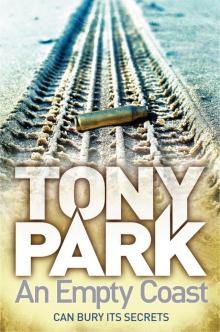 An Empty Coast
An Empty Coast Dark Heart
Dark Heart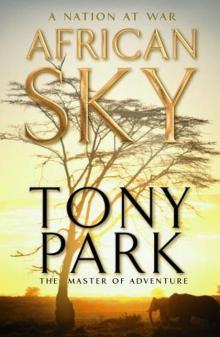 African Sky
African Sky The Delta
The Delta Captive
Captive Ivory
Ivory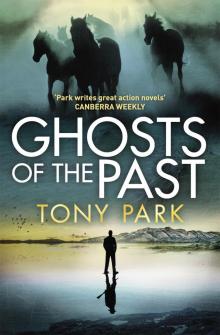 Ghosts of the Past
Ghosts of the Past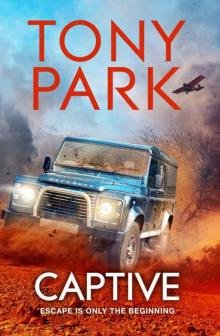 Captive_A High-octane And Gripping African Thriller
Captive_A High-octane And Gripping African Thriller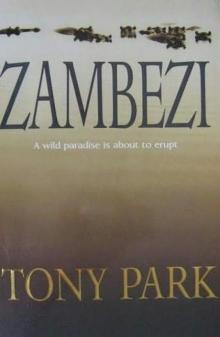 Zambezi
Zambezi Silent Predator
Silent Predator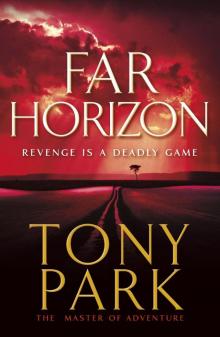 Far Horizon
Far Horizon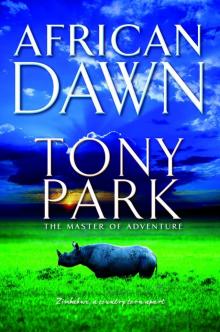 African Dawn
African Dawn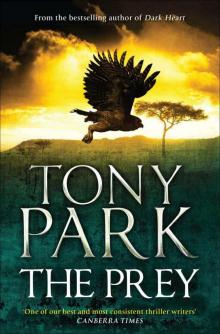 The Prey
The Prey Safari
Safari